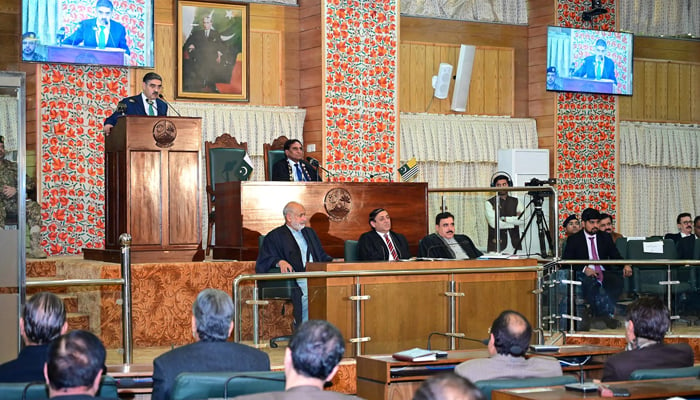PM reaffirms support for Kashmiris, rejects Indian SC verdict
MUZAFFARABAD: Caretaker Prime Minister Anwaar-ul-Haq Kakar Thursday reaffirmed Pakistan’s moral, political, and diplomatic support for the people of Kashmir and rejected the recent verdict of the Indian Supreme Court, calling it politically motivated and a tool to consolidate India’s illegal occupation.
The prime minister, in his address at the special session of the Azad Jammu and Kashmir Legislative Assembly, called for India to desist from consolidating its occupation, revoke the illegal unilateral actions of August 5, 2019, and not change the demography of the disputed territory.
Chaired by AJK Legislative Assembly Speaker Chaudhry Latif Akbar, the session was attended by AJK Prime Minister Chaudhry Anwarul Haq and members of the assembly.
The prime minister also stressed the need for India to halt the human rights abuses in IIOJ&K, repeal emergency laws, withdraw its heavy military presence and provide unhindered access to UN bodies and the international media.
Kakar, the first-ever caretaker PM to address the AJK Legislative Assembly, paid tribute to the martyrs of the Kashmir movement and those living along the Line of Control who suffered losses due to Indian ceasefire violations.
He said Pakistan would continue to stand alongside the people of Kashmir in their struggle and wished them to enjoy their due rights.
“Kashmir is Pakistan’s jugular vein. The word Pakistan is incomplete without Kashmir. The people of Pakistan and Kashmir are bound by a unique affinity. We share joy and sorrow. Pakistan cannot remain indifferent to the situation in Kashmir. Kashmir runs in our blood. Jammu and Kashmir remains an important facet of Pakistan’s foreign policy,” he said.
He said that across the political divide, the entire Pakistani leadership stood united to support Kashmiris for their right to self-determination. Giving a historical account, the prime minister said the Kashmiris had suffered enormously from conflicts in history. Even today, the situation has not improved, as the majority is still under the subjugation of an oppressor with a different name.
Prime Minister Kakar told the House that Kashmir was the oldest unsettled agenda of the United Nations as the UNSC resolutions remained unimplemented and the Indian government was bent upon consolidating its occupation of the disputed territory through a series of legislative and administrative measures.
Referring to the Indian decision to take the Kashmir issue to the United Nations and repeated Indian leaders recognising it as a dispute, he said the current Indian government must honour its longstanding commitment to the UN resolutions. He said the Indian SC verdict was politically motivated instead of grounded in law to validate the illegal unilateral measures of August 5, 2019.
The prime minister said that considering its massive human rights abuses, the Indian title of “world’s largest democracy” should be changed to “world’s largest hypocrisy”, where hollow slogans of democracy and diversity were raised to cover up the marginalisation of minorities, state-sponsored terrorism, and illegal occupation.
Calling the Indian actions in IIOJ&K a breach of the UN charter, UNSC resolutions, and international laws, he said the main objective of the Indian measures was to convert the Kashmiris into a disempowered community in their land. However, he said domestic legislation and judicial verdicts could not absolve India of its obligations. He said that, on the one hand, India wished to become a permanent member of the UN Security Council, while on the other, its leadership took pride in trampling upon international laws. Such contradictions, reinforced by Hindutva ideology, should be an eye-opener for the international community, he added.
News Desk adds: Caretaker Prime Ninister Anwaar-ul-Haq Kakar said on Thursday that disagreeing with the opinion of Quaid-e-Azam Muhammad Ali Jinnah on the issue of Israel would not amount to committing “Kufr” (sin).
During an interview, Kakar remarked that the two-state solution was the only option to the resolve the Israel-Palestine conflict. He added that this solution was not proposed by him or the country, but by the international community.
On the other hand, Israeli ambassador to the United Kingdom, Tzipi Hotovely, categorically rejected the two-state solution for the issue, saying that Israel would never accept it, even after the end of the war in Gaza.
In an interview given to British media, Hotovely said that Isarel knew it and the whole world should also know that Palestinians did not want to establish their state alongside Israel.
Hotovely commented that Palestinians are openly presenting their vision and slogan for a state “from the river to the sea”, and similarly Israel was of the view that there cannot be a Palestinian state.
Responding to Kakar’s statement, Jamaat-e-Islami’s Senator Mushtaq Ahmad said on social media platform X, formerly Twitter, that the same position as of the Quaid-e-Azam was also taken by Allama Iqbal and it was and is in line with justice, fairness and international laws.
Ahmed argued that there were many different opinions in the world on this issue and the “two-state solution” was floated by the Western bloc, led by the United States, to punish the Palestinians so as to cover up their own crimes.
He added that the authority to change the position of the country’s founder and Iqbal on the Israel-Palestine issue was not vested with the caretaker PM. He said that neither the parliament had discussed the position as of Kakar nor an elected government had given approval for it.
The JI senator questioned how a caretaker PM could give a policy of the two-state solution”, especially when Israel was committing atrocities and crimes against humanity in the Gaza Strip. He remarked that in such a situation, pushing this narrative equalled to rubbing salt into the wound.
-
 Gigi Hadid Talks About 'relieving Tension' Amid Having Hashimoto's Disease
Gigi Hadid Talks About 'relieving Tension' Amid Having Hashimoto's Disease -
 Sarah Ferguson Is 'persona Non Grata', Prince William Makes It Clear To Everyone
Sarah Ferguson Is 'persona Non Grata', Prince William Makes It Clear To Everyone -
 Northern Lights Alert On Valentine’s Day: How, Where & Best Time To Watch Auroras
Northern Lights Alert On Valentine’s Day: How, Where & Best Time To Watch Auroras -
 Dennis Quaid Reveals What Keeps His Marriage To Laura Savoie Healthy
Dennis Quaid Reveals What Keeps His Marriage To Laura Savoie Healthy -
 Mustafa Suleyman Says Microsoft Is Building Its Own AI Superintelligence
Mustafa Suleyman Says Microsoft Is Building Its Own AI Superintelligence -
 Jessica Alba, Cash Warren Finalize Divorce After 16 Years Of Marriage
Jessica Alba, Cash Warren Finalize Divorce After 16 Years Of Marriage -
 China’s AI Boom Takes Center Stage At Spring Festival One Year After DeepSeek Stirred The Industry
China’s AI Boom Takes Center Stage At Spring Festival One Year After DeepSeek Stirred The Industry -
 James Van Der Beek Called His Sixth Child Jeremiah 'healing For Us' Before His Death
James Van Der Beek Called His Sixth Child Jeremiah 'healing For Us' Before His Death -
 Elon Musk Vs Reid Hoffman: Epstein Files Fuel Public Spat Between Tech Billionaires
Elon Musk Vs Reid Hoffman: Epstein Files Fuel Public Spat Between Tech Billionaires -
 Gordon Ramsay Denies Victoria Beckham Got Handsy With Brooklyn At His Wedding
Gordon Ramsay Denies Victoria Beckham Got Handsy With Brooklyn At His Wedding -
 Gordon Ramsay Makes Unexpected Plea To Brooklyn As He Addresses Beckham Family Feud
Gordon Ramsay Makes Unexpected Plea To Brooklyn As He Addresses Beckham Family Feud -
 Prince Harry Warns Meghan Markle To 'step Back'
Prince Harry Warns Meghan Markle To 'step Back' -
 Selena Gomez Explains Why She Thought Lupus Was 'life-or-death'
Selena Gomez Explains Why She Thought Lupus Was 'life-or-death' -
 New Zealand Flood Crisis: State Of Emergency Declared As North Island Braces For More Storms
New Zealand Flood Crisis: State Of Emergency Declared As North Island Braces For More Storms -
 Nancy Guthrie Case: Mystery Deepens As Unknown DNA Found At Property
Nancy Guthrie Case: Mystery Deepens As Unknown DNA Found At Property -
 James Van Der Beek's Brother Breaks Silence On Actor's Tragic Death
James Van Der Beek's Brother Breaks Silence On Actor's Tragic Death




